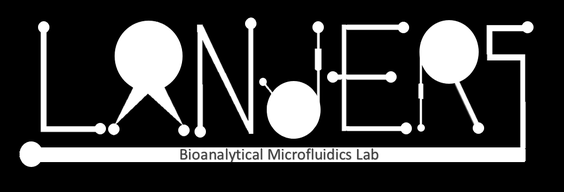Microwave PCR
Dielectric heating is commonly used, most notably in the form of a microwave oven. Our group in collaboration with Dr. N. Scott Barker in UVA’s department of Electrical and Computer Engineering is developing a microfluidic microwave heating device for small volumes of solution. Using microstrip transmission lines focused microwave power can be delivered directly to a microliter chamber containing solution. The figure shows an example of our chip-based microwave heating device. With about 1 W of non-resonant microwave power (for comparison a microwave oven uses ~ 1000 W) we rapidly heat buffer to boiling and can vary temperature by adjusting the microwave frequency, or delivered power. The figure also shows an example of temperature control by varying the applied microwave frequency. We are currently applying this technology to the polymerase chain reaction which requires thermocycling between two or three temperatures for up to 30 cycles to amplify a desired DNA fragment.
|
Contact Landers Research Group
[email protected] (434) 243-8658 375, 379, 395 Chemistry Building McCormick Road Charlottesville, Va 22904 |


